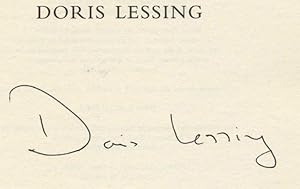The grande dame of English literature returns with a stunning collection of four short, intensely observed novels.
The title story in this collection, ‘The Grandmothers’, is an astonishing tour de force, a shockingly intimate portrait of an unconventional extended family and the lengths to which they will go to find happiness and love. Written with a cinematic eye, so that one almost feels one is watching the scenes from the sidelines, the story is a ruthless dissection of the veneer of middle-class morality and convention which manages to be at once universal and desperately, heartbreakingly personal.
‘Victoria and the Staveneys’ takes us through 20 years of the life of a young underprivilged black girl in London. A chance meeting introduces her to the world of the Staveneys – a liberal white middle-class family – and, seduced, she falls pregnant by one of the sons. As her young daughter grows up, Victoria feels her parental control diminishing as the attractions of the Staveney’s world exert themselves. An honest and often uncomfortable look at race relations in London over the past few decades, Lessing reaffirms her brilliance at demonstrating the effect of society on the individual.
‘“The Grandmothers” is a feast from life’s long banqueting table.’ Maggie Gee, Independent
‘The strangeness, the waywardness, the difficulty, and sometimes the cruelty of love – this is one of Doris Lessing’s central and recurrent subjects, which she explores better than anyone else now writing. Her gaze is so steady, her judgement so sure, her sympathy so wide. She is the most incredible of writers.’ Allan Massie, Scotsman
‘In these four tales she shows her adaptability, and her capacity to unify the most far-flung territories of human experience. Like all great writers, she brings a multitudinous sensibility to bear on individual people, on single rooms, on particular moments – and she makes them live.’ Rachel Cusk, Daily Telegraph
‘Lessing’s prose is as vigorous in these stories as it has ever been. Like D. H. Lawrence, she has an extraordinary feel not only for landscape but also for the human creature within it.’ Helen Dunmore, The Times
‘Superb. “A Love Child” is a simple story but Lessing makes it the vehicle for a rich freight of ideas and impressions. With admirable economy she summons up the peculiar atmosphere of 1930s Britain – the older generation still shocked and intimidated by the previous war, the younger driven a little crazy by the prospect of the next. It is a short fiction, but Lessing has given it all the ironies and sorrowful wisdom that belong to long duration, the sense of gradual change and of inevitable loss balanced by the slow acquisition of a fully adult sensitivity. There is not only a whole life here, but a whole interconnected web of lives.’ Lucy Hughes-Hallett, Sunday Times
![]()
